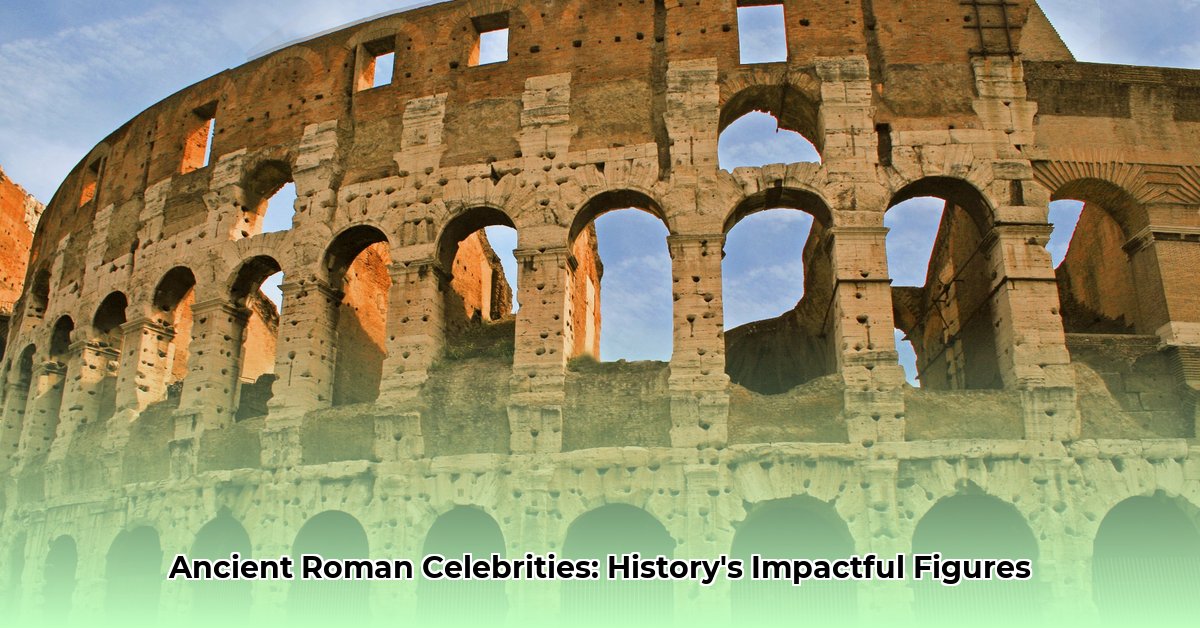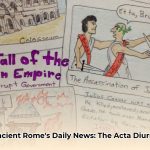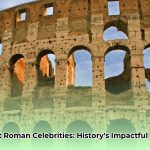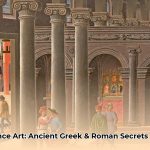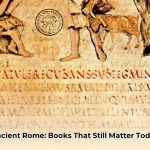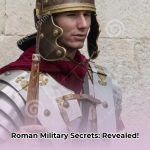Forget fleeting modern-day sensations; the true titans of ancient Rome were the power brokers, military masterminds, and cultural icons who forged an empire whose legacy still resonates millennia later. From brilliant generals who conquered vast territories to emperors whose ambitions shaped destinies, and even gladiators who became household names, we delve deep into the extraordinary lives of Rome’s most enduring figures. Prepare for captivating tales of ambition, innovation, and the undeniable human drama that defined ancient Roman society and its most influential personalities.
The Emperors: Architects of Empire, Masters of Fate
The emperors of classical civilization were not merely rulers; they were veritable Roman leaders, often embodying both divine authority and profound human flaws. Their personal narratives frequently dictated the very trajectory of the Roman Empire, leaving an indelible mark on Western civilization.
Julius Caesar: The Uncrowned King
Few names are as synonymous with military genius and political cunning as Julius Caesar. Far more than just a general, he was a master orator, a captivating speaker, and a brilliant strategist whose conquests in Gaul effectively wrote his ticket to unparalleled fame and political power. Caesar’s ambition knew no bounds; he openly defied the Senate, Rome’s traditional governing body, and hinted at monarchical aspirations — a significant deviation for a republic founded on ideals of shared governance. His reforms, including the implementation of the Julian calendar, showcased his administrative prowess, yet his audacious pursuit of absolute power ultimately led to his dramatic assassination on the Ides of March. Was he a revolutionary who recognized the inherent limitations of the Roman Republic, or a power-hungry tyrant who met a deserved end? The historical impact of his actions remains a topic of fervent debate among historians, forever altering the course of Roman governance.
Augustus: The Era of Roman Peace
Talk about a formidable legacy to inherit! Augustus, Caesar’s adopted son, faced the immense challenge of stabilizing Rome after his predecessor’s brutal murder and a period of civil strife. Yet, he not only succeeded but excelled, skillfully navigating the treacherous political landscape to establish the Pax Romana (Roman Peace) — a golden age of enduring stability and prosperity that remarkably spanned over two centuries. His reign saw unprecedented infrastructure development, from temples to public baths and majestic monuments celebrating victories. Augustus was also a master of propaganda, commissioning art and literature that meticulously glorified his reign and cemented his cultural legacy. He carefully presented himself as restoring the Republic while subtly consolidating absolute authority, ushering in the Principate system. Was he a genuine statesman who ushered stability into a chaotic world, or merely a brilliant manipulator who expertly controlled the public narrative? The perspective often depends on the source, but his tangible achievements are undeniable.
Trajan: Apex of Imperial Expansion
From the arduous battlefield to the intricate halls of administration, Trajan defined effective leadership. The first Roman emperor of non-Italian origin, his reign (98-117 CE) saw Rome reach its maximum territorial extent. He was undeniably a soldier-emperor, personally leading his legions to conquer new territories like Dacia (modern Romania), bringing immense wealth and resources back to Rome. Yet, his reign wasn’t solely defined by warfare. He invested substantially in vital public works, including extensive road networks, aqueducts that supplied fresh water, and public buildings, ensuring the empire’s sustained prosperity. His alimenta program, supporting poor children, showcased a notable commitment to social welfare and a pragmatic understanding that a contented populace inherently equates to a stable and loyal populace. His Forum, Markets, and iconic Column were unequivocal statements of Roman power and ingenuity, serving as a towering visual narrative of Roman dominance and its formidable empire building. Trajan profoundly understood the indispensable importance of collaborating effectively with the Roman Senate, consistently respecting their long-standing traditions and actively seeking their counsel on significant matters.
Hadrian: Consolidator and Cultural Enthusiast
If Trajan epitomized expansion, Hadrian’s focus was on pragmatic consolidation. He astutely recognized the inherent limits of perpetual Roman growth and strategically prioritized fortifying existing borders. His most iconic undertaking, Hadrian’s Wall in Britain, stands today as a monumental testament to his discerning and pragmatic approach to empire building. Hadrian was also a highly cultured emperor, a patron of the arts, and an architect himself, evident in his redesign of the Pantheon. His extensive travels throughout the empire allowed him to personally oversee its administration and address local concerns, demonstrating a hands-on approach to governance. Was he a true visionary who understood the boundaries of Roman power, or simply a realist who knew precisely when to strategically cut losses? Historical consensus suggests a compelling blend of both, marking a shift from aggressive expansion to internal strengthening.
Marcus Aurelius: The Philosopher King
Now here’s a figure who could genuinely offer timeless wisdom to modern leaders. Marcus Aurelius was a rare and profound breed: an emperor who meticulously lived by the Stoic philosophy he espoused. His seminal work, “Meditations,” continues to be studied globally for its profound insights into leadership, resilience, and living a virtuous life. Despite his peaceful nature, his reign (161-180 CE) was marked by constant warfare against Germanic tribes and the Parthian Empire, as well as the devastating Antonine Plague. He faced these challenges with unwavering resolve, guided by his philosophical principles. With its profound emphasis on duty and self-control, his philosophical approach offers valuable lessons for today’s often turbulent leadership dynamics, though his decision to appoint his ill-suited son Commodus as his successor remains a point of historical contention.
Nero: The Tyrant or the Misunderstood Artist?
Prepare for a descent into the notorious side of Roman celebrity. Nero (54-68 CE) is arguably the most infamous of all emperors, largely thanks to persistent, though disputed, rumors that he “fiddled while Rome burned.” His reign was unfortunately characterized by extravagance, cruelty, and rampant paranoia. The traditional image of Nero as an utterly depraved tyrant is overwhelmingly rooted in biased narratives from senatorial sources who frequently clashed with his populist policies and perceived disdain for their established authority.
The grave accusation that Nero deliberately started the Great Fire of Rome in 64 CE is highly dubious; even the celebrated historian Tacitus, a primary source, admits this was merely a rumor. Nero was reportedly in Antium during the fire itself and, upon his swift return, actively organized extensive relief efforts, utilizing his own personal funds and compassionately opening his palaces. However, his subsequent blame of Christians for the fire led to their brutal persecution, undeniably staining his legacy.
Nero’s reign also saw significant public works, including the lavish Domus Aurea, and he was known for his artistic pursuits, performing music and poetry. Was he a truly misunderstood artist with a flair for the dramatic, or a genuinely depraved ruler whose actions plunged Rome into turmoil? The historical record, despite its complexities, is largely unfavorable to his image, especially regarding his increasingly erratic and tyrannical behavior and the political executions, including that of his own mother, Agrippina the Younger.
Commodus: A Precipitous Fall
A stark example of a precipitous fall from grace, Commodus (180-192 CE) was the biological son of the revered Marcus Aurelius. He inherited immense power and privilege, yet instead of emulating his father’s virtuous reign, he fully indulged in self-gratification and ruthless tyranny. His obsession with gladiatorial combat, often participating himself in rigged contests, alienated the traditional Roman elite and signaled the ominous beginning of a long and challenging decline for the Roman Empire. He was a spoiled celebrity utterly unprepared for the immense burdens of leadership, a tragic figure whose actions contributed significantly to the period of instability following the “Five Good Emperors.”
Military Geniuses: Forging an Empire through Conquest
Beyond the emperors, the Roman Empire relied on brilliant military minds who expanded its borders and secured its power.
Gaius Marius: Reformer of the Legions
Gaius Marius (157-86 BCE) was a legendary Roman general and statesman who fundamentally transformed the Roman army into one of the most effective fighting forces the world had ever seen. He held the office of consul an unprecedented seven times. His radical reforms allowed non-landowners to enlist, creating a professional standing army loyal to its general rather than the state. These changes dramatically increased recruitment and efficiency, enabling him to win decisive battles against barbarian tribes, saving the Republic from seemingly inevitable defeat. However, his military success also inadvertently contributed to the Republic’s downfall by concentrating immense power in the hands of individual generals, setting a dangerous precedent for future civil wars.
Scipio Africanus: Conqueror of Hannibal
Publius Cornelius Scipio Africanus (236–183 BCE) stands as one of history’s greatest military commanders. His strategic genius was most famously displayed during the Second Punic War, where he outmaneuvered and decisively defeated Hannibal, Carthage’s legendary general, at the Battle of Zama. His victories in Hispania and North Africa earned him the honorific Africanus and solidified Rome’s dominance in the Mediterranean. Scipio’s innovative tactics and disciplined leadership were instrumental in securing Rome’s survival and rise as a superpower, demonstrating how individual brilliance on the battlefield could reshape geopolitical landscapes.
Orators, Philosophers, and Thinkers: The Intellectual Backbone
Rome’s cultural legacy wasn’t exclusively forged by emperors and generals; these crucial Roman figures significantly shaped the destiny of the empire through intellect, persuasion, and profound insights.
Cicero: Rome’s Master of Rhetoric
If Rome boasted a preeminent public intellectual, it was undoubtedly Marcus Tullius Cicero (106–43 BCE). A renowned orator, skilled lawyer, and astute statesman, his eloquently crafted speeches and profound philosophical writings profoundly influenced political thought for centuries to come. His words wielded immense power, effectively shaping public opinion and frequently swaying the course of significant events, such as his exposing of the Catilinarian conspiracy. Cicero was an absolute master of rhetoric, possessing an unparalleled ability to persuade even the most hardened opponents. A staunch defender of republican values, his steadfast opposition to autocracy ultimately led to his tragic execution during the proscriptions of the Second Triumvirate, cementing his legacy as a martyr for the Republic.
Seneca the Younger: Stoic Mentor
Lucius Annaeus Seneca (c. 4 BCE–65 CE) was a leading Stoic philosopher, dramatist, and statesman. He served as tutor and later advisor to Emperor Nero, attempting to guide the young ruler towards just governance during his early, more promising years. Seneca’s philosophical essays and letters, such as “On the Shortness of Life” and “Moral Letters to Lucilius,” offer profound insights into Stoic principles of virtue, resilience, and self-control. His works continue to be studied for their timeless wisdom on how to navigate life’s challenges and maintain inner peace amidst external chaos. Ultimately, he was implicated in a conspiracy against Nero and forced to commit suicide, facing his death with Stoic composure.
Virgil: Poet of Empire
Publius Vergilius Maro (70–19 BCE), known simply as Virgil, was the preeminent Roman poet of the Augustan age. His epic poem, the Aeneid, tells the story of Aeneas, a Trojan hero who journeys to Italy to found the city of Rome. Commissioned by Augustus, the Aeneid served as a national epic, glorifying Rome’s mythical origins and providing a literary foundation for the burgeoning Roman Empire. Virgil’s masterful use of language, vivid imagery, and profound emotional depth earned him immense acclaim and an enduring place in the literary canon, influencing Western literature for millennia. His works not only celebrated Rome’s destiny but also explored themes of duty, fate, and the human condition.
Gladiators: The Unlikely Superstars
Forget contemporary athletes draped in endorsement deals; in ancient Rome, the undeniable superstars were gladiators. These formidable warriors fought with incredible bravery, often to the death, in grand arenas, risking their very lives for the enthrallment of the Roman populace.
Spartacus: The Rebel Slave
Without a doubt, one of the most famous figures to emerge from the gladiatorial arena was Spartacus (c. 111–71 BCE). A Thracian warrior enslaved and trained as a gladiator, Spartacus led one of the largest slave revolts against the Roman Republic. Beginning with a daring escape of some 70 fellow gladiators from a training school in Capua, his rebellion swelled into an army of tens of thousands of runaway slaves, challenging the very foundations of Roman society. Over two years, Spartacus’s forces achieved several victories against Roman legions before ultimately being crushed. While his rebellion failed, Spartacus became an enduring symbol of resistance against oppression and a testament to the fierce will for independence, his story resonating through the ages as a powerful narrative of human dignity.
Priscus and Verus: A Legendary Draw
While their names might not resonate as widely as some emperors, the gladiators Priscus and Verus achieved legendary status for their truly epic battle. This unique spectacle, part of the inaugural games for the newly completed Flavian Amphitheater (Colosseum) in 80 CE, culminated in a rare double draw. After hours of grueling combat, both men simultaneously yielded, prompting immense fervor from the crowd and the unprecedented award of freedom for both gladiators by Emperor Titus. This singular event vividly illustrates the profound entertainment value, the potential for unexpected outcomes, and the emotional connection the Roman populace felt for their arena heroes, highlighting a moment when valor transcended usual gladiatorial outcomes.
Powerful Women: Shaping History from Behind the Scenes
Ancient Rome was not exclusively a man’s domain. Formidable and influential women also played pivotal roles in shaping the course of Roman history and power struggles, often through cunning, diplomacy, or sheer force of personality.
Cleopatra: Queen of the Nile, Entangler of Romans
Though not Roman by birth, Cleopatra VII Philopator (69–30 BCE), the last active pharaoh of Egypt, wielded immense influence over Roman political affairs through her strategic relationships with two of Rome’s most powerful men: Julius Caesar and Mark Antony. She was a brilliant strategist, a skilled diplomat, and possessed an undeniably captivating personality. Her pursuit of alliances with Roman leaders was driven by a fierce determination to protect Egypt’s independence and secure its future against the encroaching Roman Republic. Was she a cunning manipulator who skillfully utilized her charm to achieve her goals, or a shrewd politician fiercely dedicated to protecting her kingdom? Her tragic end, committing suicide after the defeat of Mark Antony by Octavian, solidified her image as a legendary figure whose personal life was inextricably linked with the destiny of the Roman world, profoundly impacting the power struggles that ultimately led to the formation of the Roman Empire.
Insights from Antiquity: Lessons for Modern Leadership
What invaluable insights can we glean from these ancient Roman celebrities? Here’s a succinct breakdown of their leadership attributes and their contemporary relevance:
| Leader | Strengths | Weaknesses | Modern Application |
|---|---|---|---|
| Julius Caesar | Military brilliance and strategic foresight, exceptional political acumen and charismatic leadership, ability to inspire fierce loyalty, and a deep commitment to the well-being of his soldiers. | Unrestrained and potentially dangerous ambition, a marked disregard for established tradition, a strong tendency toward authoritarianism, and a willingness to employ violence to achieve his ultimate goals. | Cultivate strategic thinking and decisive leadership, but always remain vigilant against unchecked power and the erosion of democratic principles. Understand when to innovate and when to respect established norms. |
| Augustus | Strategic vision encompassing long-term stability, unparalleled political skill, a remarkable capacity for peace-building, an intrinsic ability to establish enduring stability following civil strife, and highly effective use of narrative to expertly shape public opinion. | A notable tendency towards manipulation (e.g., of the Senate), tight control of information dissemination |
